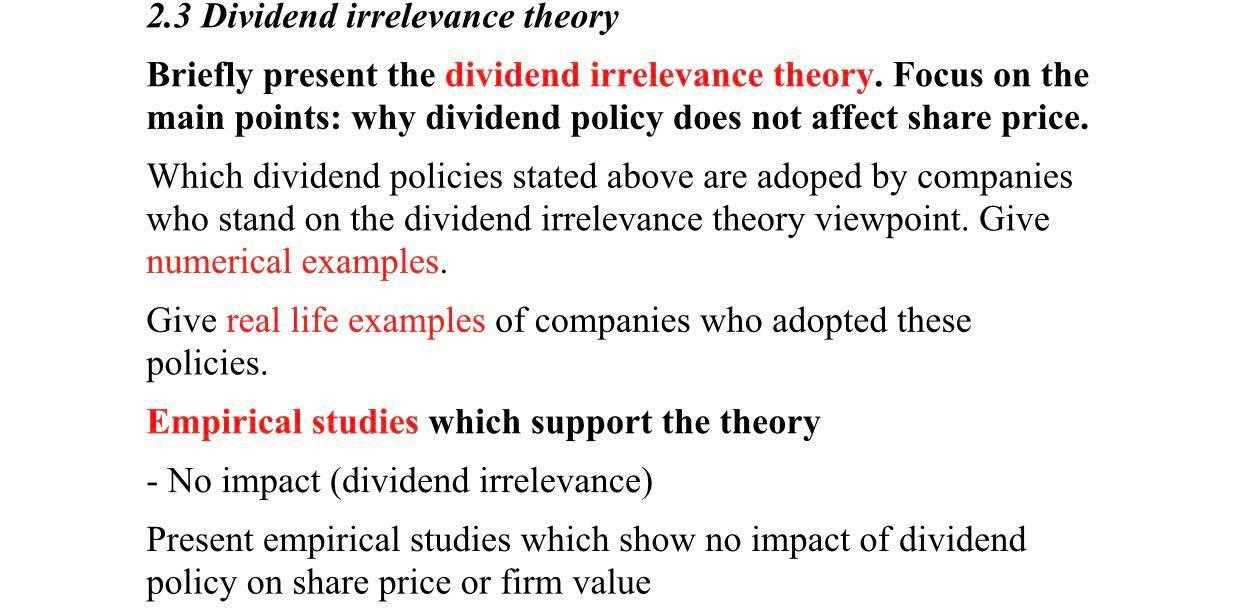Dividend Irrelevance Theory: Definition and Investing Strategies
This theory was first proposed by economists Franco Modigliani and Merton Miller in 1961. They argued that in a perfect market with no taxes or transaction costs, the value of a firm is determined solely by its earning power and risk profile, not by its dividend policy.
Dividend irrelevance theory challenges the traditional belief that higher dividends lead to higher stock prices. According to this theory, a company’s decision to pay dividends or retain earnings should not affect its stock price, as investors can create their own dividends by selling a portion of their shares.
Modigliani and Miller’s theory is based on several assumptions. First, they assume that investors have access to perfect information and can freely buy or sell shares without any restrictions. Second, they assume that investors are rational and make decisions based on maximizing their wealth. Finally, they assume that the market is efficient and prices reflect all available information.
Investing Strategies Based on Dividend Irrelevance Theory
Since the dividend policy of a company is considered irrelevant, investors should focus on other factors when making investment decisions. Some strategies that can be employed include:
- Capital Appreciation: Investors can focus on companies that have the potential for significant capital appreciation. These companies may reinvest their earnings into growth opportunities, rather than paying dividends.
- Dividend Yield: Investors can also consider the dividend yield of a company when making investment decisions. The dividend yield is calculated by dividing the annual dividend per share by the stock price. Companies with higher dividend yields may be attractive to income-focused investors.
- Dividend Growth: Another strategy is to invest in companies that have a history of consistently increasing their dividends over time. These companies may provide a growing stream of income for investors.
It is important to note that while the dividend irrelevance theory suggests that dividend policy does not affect a company’s value, it does not imply that dividends are unimportant. Dividends can still be an important source of income for investors, especially those who rely on regular cash flows.
Dividend Irrelevance Theory is a concept in finance that suggests that the payment of dividends by a company does not affect its overall value or the wealth of its shareholders. According to this theory, the value of a company is determined solely by its underlying assets and the future cash flows it is expected to generate, regardless of how those cash flows are distributed to shareholders.
This theory was first proposed by economists Franco Modigliani and Merton Miller in 1961, and it has since become a fundamental principle in the field of finance. The main idea behind the theory is that investors can create their own desired cash flows by selling a portion of their shares, so the company’s decision to pay dividends or retain earnings should not impact the value of the shares.
Assumptions of Dividend Irrelevance Theory
In order to understand the implications of Dividend Irrelevance Theory, it is important to consider the assumptions on which it is based. These assumptions include:
- Perfect capital markets: The theory assumes that there are no transaction costs, taxes, or other frictions in the market that would affect the value of dividends.
- Rational investors: The theory assumes that investors are rational and make decisions based on the expected returns and risks associated with different investments.
- Homogeneous expectations: The theory assumes that all investors have the same expectations about the future cash flows of the company.
- Dividend policy irrelevance: The theory assumes that the company’s dividend policy does not affect its investment decisions or the availability of external financing.
Implications of Dividend Irrelevance Theory

Dividend Irrelevance Theory has several important implications for investors and companies. Firstly, it suggests that investors should focus on the overall value and future cash flows of a company, rather than its dividend payments. This means that companies with high dividend yields may not necessarily be better investments than those with lower yields.
Secondly, the theory implies that companies can choose to pay dividends or retain earnings based on their own financial needs and investment opportunities, without worrying about the impact on their stock prices. This gives companies more flexibility in managing their cash flows and making strategic decisions.
Lastly, Dividend Irrelevance Theory suggests that investors can create their own desired cash flows by selling a portion of their shares, regardless of whether the company pays dividends. This means that investors can effectively “create” their own dividends by selling shares when they need cash, without relying on the company’s dividend policy.
Conclusion

Investing Strategies Based on Dividend Irrelevance Theory
The dividend irrelevance theory, proposed by economists Franco Modigliani and Merton Miller in 1961, suggests that the dividend policy of a company has no impact on its stock price. According to this theory, investors are indifferent to whether a company pays dividends or retains earnings to reinvest in the business.
Based on the dividend irrelevance theory, here are some investing strategies that investors can consider:
- Growth Investing: Investors can focus on companies that have strong growth prospects and reinvest their earnings back into the business instead of paying dividends. These companies are typically in industries with high growth potential and may offer higher capital appreciation in the long run.
- Value Investing: Investors can look for undervalued companies that have the potential to generate significant cash flows in the future. These companies may not pay high dividends currently, but if their business improves, they may increase their dividend payments in the future, leading to potential capital gains for investors.
- Dividend Investing: While dividends may not directly impact stock prices according to the dividend irrelevance theory, some investors still prefer to invest in companies that have a consistent track record of paying dividends. Dividend-paying stocks can provide a regular income stream and may be suitable for investors seeking stable returns.
- Dividend Reinvestment Plans (DRIPs): Investors can consider participating in dividend reinvestment plans offered by companies. DRIPs allow investors to automatically reinvest their dividends to purchase additional shares of the company’s stock. This strategy can help investors compound their returns over time and potentially increase their overall investment value.
- Portfolio Diversification: Regardless of the dividend policy, it is always important for investors to diversify their portfolios. By investing in a mix of dividend-paying and non-dividend-paying stocks, as well as other asset classes such as bonds and real estate, investors can reduce their overall risk and potentially enhance their returns.

Emily Bibb simplifies finance through bestselling books and articles, bridging complex concepts for everyday understanding. Engaging audiences via social media, she shares insights for financial success. Active in seminars and philanthropy, Bibb aims to create a more financially informed society, driven by her passion for empowering others.
